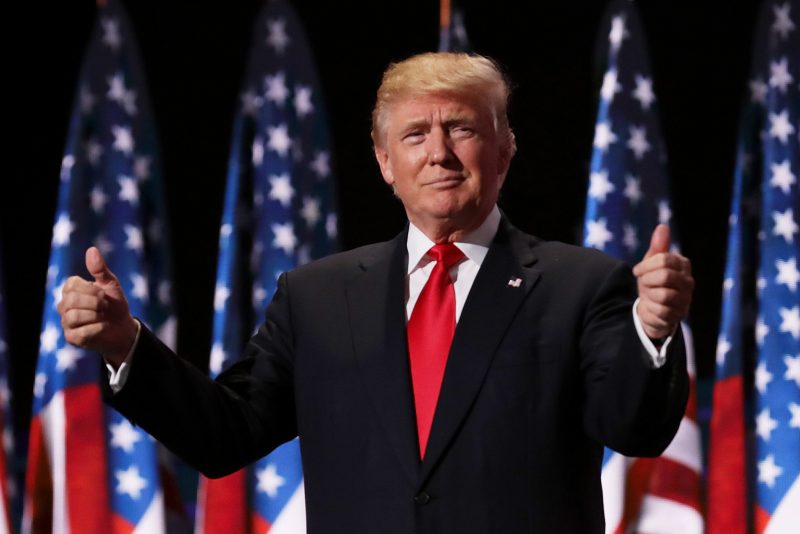latest
Massachusetts AG Healey responds to President Trump’s comments with advisory on voting intimidation

Attorney General Maura Healey has issued an advisory which addresses intimidating or interfering with voters.
A statement by Healey was in response to a recent televised interview where President Trump was asked whether he would send “poll watchers” to monitor elections for possible voter fraud. He responded by saying, “We’re going to have everything. We’re going to have sheriffs and law enforcement and we’re going to have, hopefully, U.S. attorneys, and we’re going to have everybody, and attorney generals, but it’s very hard.”
“We won’t sit idle in the face of President Trump’s dangerous threats to undermine our electoral process and suppress votes,” said Attorney General Maura Healey. “We are issuing this advisory to ensure citizens of Massachusetts know they are entitled to free and fair elections and to put President Trump on notice that any attempt to interfere with our democracy will not be tolerated.”
“The President’s threats to increase the presence of law enforcement at polling locations will lead to the intimidation of voters of color and immigrants, who have been targeted by the administration’s racist and xenophobic policies and rhetoric in the past four years,” said Beth Huang, Director of the Massachusetts Voter Table. “We are working with community organizations across the Commonwealth to ensure that all voters know and exercise their right to vote safely this fall.”
“Attempts to suppress and intimidate voters are, tragically, nothing new in our democracy,” said Cheryl Clyburn Crawford, Executive Director at MassVOTE. “The President’s threat to send military or law enforcement personnel to our polling places is, ironically, an attempt to scare individuals out of voting. It should not stand and will not. We applaud the Attorney General for standing so strongly on this issue, and we will support her every step of the way.”
AG Healey’s “Advisory on Poll Monitoring and Voter Intimidation,” was issued to local officials and community organizations and is available in English and Spanish. It states the following:
State law prohibits intimidation of voters and interference with elections officers by anyone, including law enforcement officers and private citizens. Violations of the law are punishable by fines or imprisonment. State law also requires that local police officers be at polling places to assist local election officials and to perform other functions relating to ensuring that voters aren’t obstructed from voting. Police officers working at election sites are generally barred from entering the immediate voting area, unless requested to assist the chief election official at a polling place.
The President cannot send the military and/or federal law enforcement to monitor the polls. An array of federal statutes bar federal employees, law enforcement, and the military from using their official power to interfere with an election, and specifically prohibit the military or other armed federal officers from being present at polling places, except to “repel armed enemies of the United States.” Violators can face fines and imprisonment. Federal law also prohibits federal and state administrative employees from interfering with, or affecting, a presidential or congressional election that has been financed in whole or in part by the federal government.
The President cannot order state and local law enforcement officials to monitor the polls. The President’s authority does not extend to state and local law enforcement. State and local administrative employees also face criminal sanctions if they interfere with a presidential or congressional election where the state is in receipt of federal funds used in connection with administering the election. Violations are punishable by fines or imprisonment.
There are permissible forms of election observation and monitoring. Massachusetts law provides that elections must be conducted in a manner that is open to public observation. Poll observers are allowed inside the polling place, unless they are disorderly or obstruct the access of voters. The Voting Rights Act permits federal observers to monitor voting conditions in certain eligible jurisdictions to ensure the right to vote is protected. Poll watchers may observe polling place operations but under no circumstances can they intimidate, threaten, coerce or otherwise interfere with a voter’s right to cast a ballot.
The law prohibits private citizens from intimidating voters at the polls. A number of federal and state laws prohibit private actors from engaging in voter intimidation. These laws serve to protect against intimidation, threats and coercion when citizens are casting votes for the candidate of their choice. A non-exclusive list of conduct that may constitute impermissible voter intimidation where directed at interfering with a citizen’s right to vote includes: verbal or physical confrontations, a request for documentation where none is required, following or otherwise harassing a voter, using threatening language, challenging a voter for the purpose of intimidation, or otherwise acting in an intimidating manner.
AG Advisory Poll Monitoring and Voter Intimidation





You must be logged in to post a comment Login